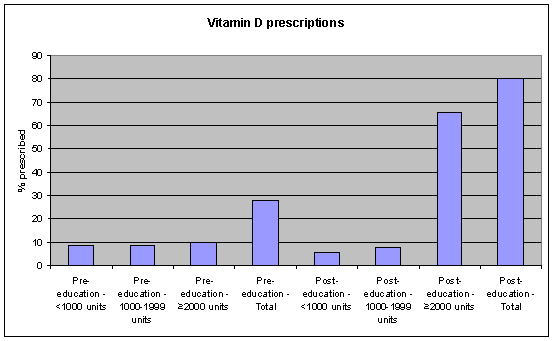Session Information
Session Type: Abstract Submissions (ACR)
Background/Purpose:
Vitamin D deficiency and insufficiency are important clinical states with the potential for adverse skeletal and non-skeletal consequences. In our experience the management of these states is frequently suboptimal. Focused educational initiatives are a proven means to improve patient care. The aim of this study was to evaluate the effectiveness of a focused educational intervention in improving the supplementation of patients with vitamin D deficiency and insufficiency.
Methods:
A prospective study of 100 consecutive patients in the general rheumatology clinic with 25-hydroxyvitamin D deficiency or insufficiency (as defined as <30ng/ml) measured within the previous year was undertaken. A systematic literature review was performed and a consensus decision was made to supplement all patients with 25-hydroxyvitamin D <30ng/ml with 2000 units of vitamin D a day, with repeat testing at the next visit to ensure adequate but not excess supplementation. Following this a teaching session was held educating members of the multi-disciplinary team on the importance of vitamin D supplementation and reminders to supplement patients were placed in the clinic offices. Following the education intervention a further prospective study of 100 consecutive patients with 25-hydroxyvitamin D <30ng/ml measured within the previous year was performed.
Results:
In the initial 100 patients screened, 25% were male, mean age was 56 years. Primary diagnosis was inflammatory arthritis (IA) in 62%, connective tissue disease (CTD) in 14%, osteoarthritis (OA) in 12% and other conditions in 12%. 18% had known osteoporosis and 13% had previous fractures. Mean 25-hydroxyvitamin D was 17.8 ng/ml. 20 patients had 25-hydroxyvitamin D <12ng/ml, 40 had 25-hydroxyvitamin D 12-20ng/ml, 40 had 25-hydroxyvitamin D 20-30ng/ml. Pre-education only 28 patients had additional vitamin D prescribed as a result. Following the educational intervention, in the population screened 25% were male, mean age was 55 years. Primary diagnosis was IA in 47%, OA in 16%, CTD in 11% and other conditions in 26%. 15% had known osteoporosis and 12% had previous fractures. Mean 25-hydroxyvitamin D was 16.4 ng/ml. 31 patients had 25-hydroxyvitamin D <12ng/ml, 39 had 25-hydroxyvitamin D 12-20ng/ml, 30 had 25-hydroxyvitamin D 20-30ng/ml. As a consequence of our educational intervention, 80 patients had additional vitamin D prescribed. The change in vitamin D prescriptions following the educational intervention is shown in figure 1.
Conclusion:
A focused educational intervention has the potential to improve vitamin D supplementation and patient care in the management of low vitamin D states. Failure to identify and adequately treat vitamin D deficiency has the potential for serious adverse consequences for our patients.
Figure 1: % of Patients Prescribed, and Dose Prescribed of, Vitamin D Pre and Post an Educational Initiative
Disclosure:
C. Low,
Roche Pharmaceuticals,
2,
UCB Pharma,
2,
Merck Pharmaceuticals,
7;
R. Conway,
Roche Pharmaceuticals,
2,
UCB Pharma,
2,
Merck Pharmaceuticals,
7;
G. Cunnane,
None;
M. Doran,
None;
F. D. O’Shea,
None.
« Back to 2012 ACR/ARHP Annual Meeting
ACR Meeting Abstracts - https://acrabstracts.org/abstract/effectiveness-of-a-focused-educational-intervention-in-improving-the-supplementation-of-vitamin-d-deficiency-and-insufficiency/

